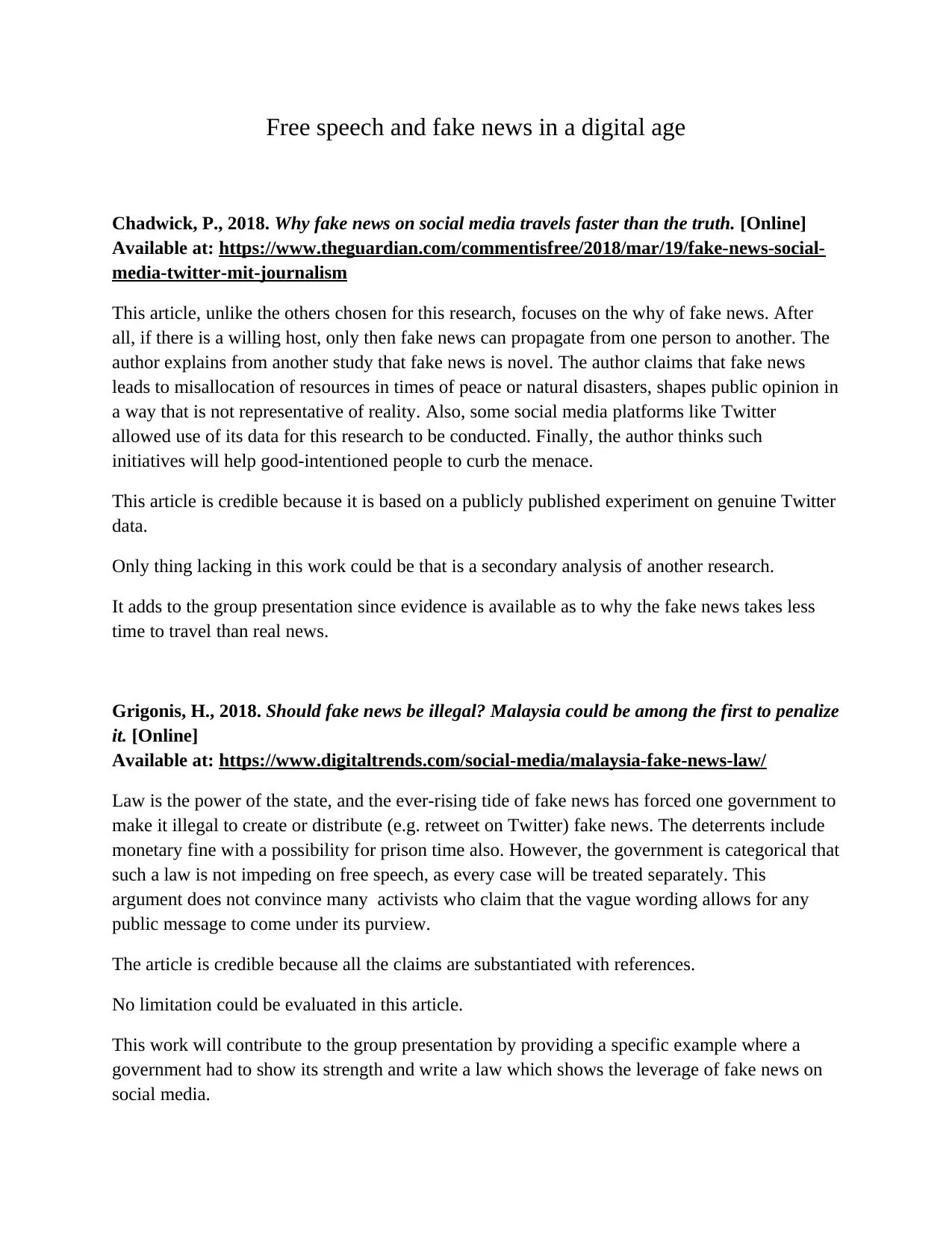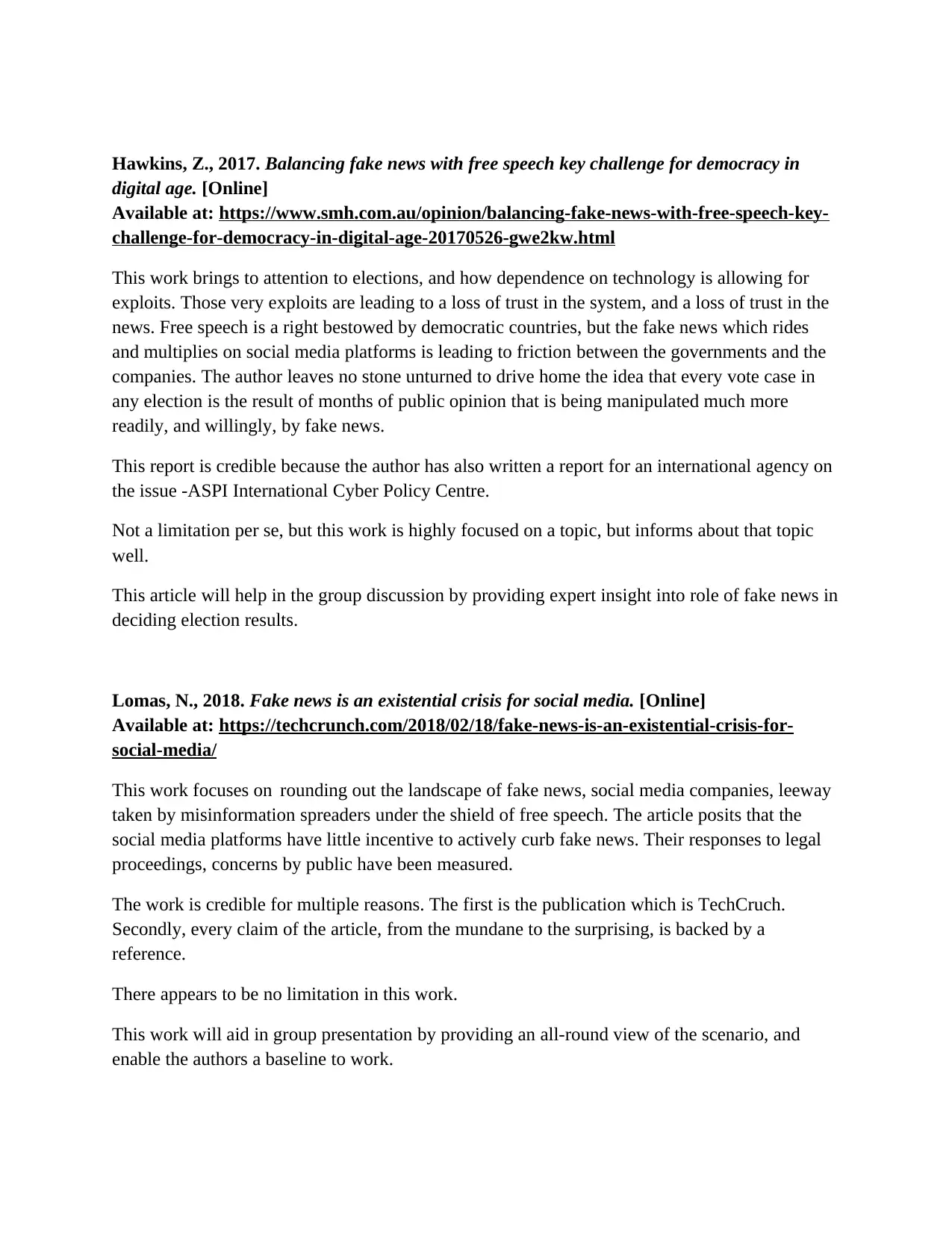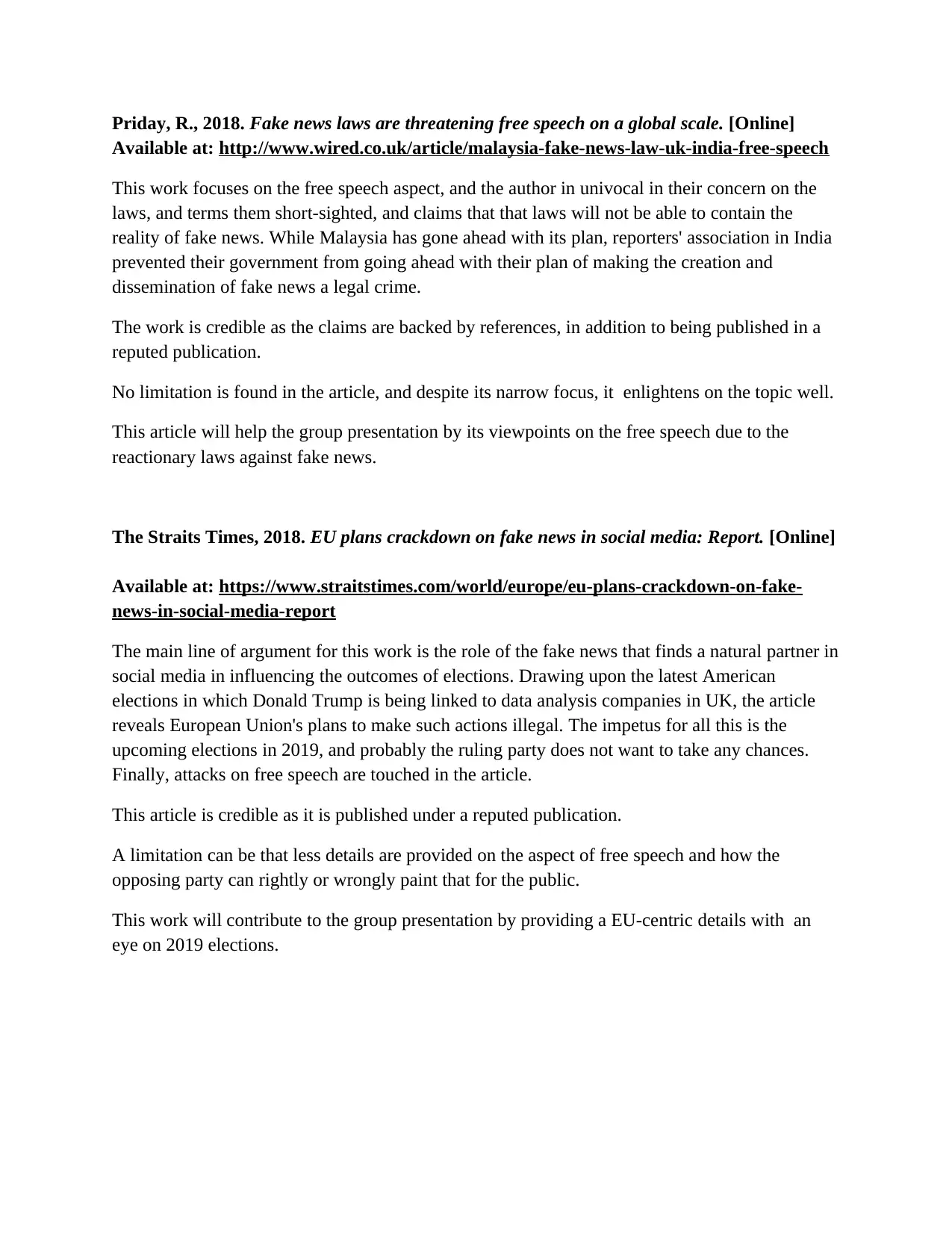The Impact of Fake News on Free Speech and Elections
VerifiedAdded on 2021/06/18
|3
|1137
|301
Report
AI Summary
This report analyzes the complex relationship between fake news and free speech, particularly in the context of elections. It examines multiple articles, exploring the 'why' behind the rapid spread of fake news, its impact on resource allocation, and its influence on public opinion, referencing studies on social media platforms like Twitter. The report also discusses legal responses to fake news, such as Malaysia's law making it illegal to create or distribute fake news, and the debates surrounding free speech. The analysis further investigates the role of fake news in elections, the influence of technology, and the erosion of trust in news sources. Additionally, it covers the responses of social media platforms, the potential for manipulation, and global perspectives including the EU's plans to combat fake news. The report highlights the challenges in balancing free speech with the need to combat misinformation in the digital age and provides a comprehensive overview of the topic.

Free speech and fake news in a digital age
Chadwick, P., 2018. Why fake news on social media travels faster than the truth. [Online]
Available at: https://www.theguardian.com/commentisfree/2018/mar/19/fake-news-social-
media-twitter-mit-journalism
This article, unlike the others chosen for this research, focuses on the why of fake news. After
all, if there is a willing host, only then fake news can propagate from one person to another. The
author explains from another study that fake news is novel. The author claims that fake news
leads to misallocation of resources in times of peace or natural disasters, shapes public opinion in
a way that is not representative of reality. Also, some social media platforms like Twitter
allowed use of its data for this research to be conducted. Finally, the author thinks such
initiatives will help good-intentioned people to curb the menace.
This article is credible because it is based on a publicly published experiment on genuine Twitter
data.
Only thing lacking in this work could be that is a secondary analysis of another research.
It adds to the group presentation since evidence is available as to why the fake news takes less
time to travel than real news.
Grigonis, H., 2018. Should fake news be illegal? Malaysia could be among the first to penalize
it. [Online]
Available at: https://www.digitaltrends.com/social-media/malaysia-fake-news-law/
Law is the power of the state, and the ever-rising tide of fake news has forced one government to
make it illegal to create or distribute (e.g. retweet on Twitter) fake news. The deterrents include
monetary fine with a possibility for prison time also. However, the government is categorical that
such a law is not impeding on free speech, as every case will be treated separately. This
argument does not convince many activists who claim that the vague wording allows for any
public message to come under its purview.
The article is credible because all the claims are substantiated with references.
No limitation could be evaluated in this article.
This work will contribute to the group presentation by providing a specific example where a
government had to show its strength and write a law which shows the leverage of fake news on
social media.
Chadwick, P., 2018. Why fake news on social media travels faster than the truth. [Online]
Available at: https://www.theguardian.com/commentisfree/2018/mar/19/fake-news-social-
media-twitter-mit-journalism
This article, unlike the others chosen for this research, focuses on the why of fake news. After
all, if there is a willing host, only then fake news can propagate from one person to another. The
author explains from another study that fake news is novel. The author claims that fake news
leads to misallocation of resources in times of peace or natural disasters, shapes public opinion in
a way that is not representative of reality. Also, some social media platforms like Twitter
allowed use of its data for this research to be conducted. Finally, the author thinks such
initiatives will help good-intentioned people to curb the menace.
This article is credible because it is based on a publicly published experiment on genuine Twitter
data.
Only thing lacking in this work could be that is a secondary analysis of another research.
It adds to the group presentation since evidence is available as to why the fake news takes less
time to travel than real news.
Grigonis, H., 2018. Should fake news be illegal? Malaysia could be among the first to penalize
it. [Online]
Available at: https://www.digitaltrends.com/social-media/malaysia-fake-news-law/
Law is the power of the state, and the ever-rising tide of fake news has forced one government to
make it illegal to create or distribute (e.g. retweet on Twitter) fake news. The deterrents include
monetary fine with a possibility for prison time also. However, the government is categorical that
such a law is not impeding on free speech, as every case will be treated separately. This
argument does not convince many activists who claim that the vague wording allows for any
public message to come under its purview.
The article is credible because all the claims are substantiated with references.
No limitation could be evaluated in this article.
This work will contribute to the group presentation by providing a specific example where a
government had to show its strength and write a law which shows the leverage of fake news on
social media.
Paraphrase This Document
Need a fresh take? Get an instant paraphrase of this document with our AI Paraphraser

Hawkins, Z., 2017. Balancing fake news with free speech key challenge for democracy in
digital age. [Online]
Available at: https://www.smh.com.au/opinion/balancing-fake-news-with-free-speech-key-
challenge-for-democracy-in-digital-age-20170526-gwe2kw.html
This work brings to attention to elections, and how dependence on technology is allowing for
exploits. Those very exploits are leading to a loss of trust in the system, and a loss of trust in the
news. Free speech is a right bestowed by democratic countries, but the fake news which rides
and multiplies on social media platforms is leading to friction between the governments and the
companies. The author leaves no stone unturned to drive home the idea that every vote case in
any election is the result of months of public opinion that is being manipulated much more
readily, and willingly, by fake news.
This report is credible because the author has also written a report for an international agency on
the issue -ASPI International Cyber Policy Centre.
Not a limitation per se, but this work is highly focused on a topic, but informs about that topic
well.
This article will help in the group discussion by providing expert insight into role of fake news in
deciding election results.
Lomas, N., 2018. Fake news is an existential crisis for social media. [Online]
Available at: https://techcrunch.com/2018/02/18/fake-news-is-an-existential-crisis-for-
social-media/
This work focuses on rounding out the landscape of fake news, social media companies, leeway
taken by misinformation spreaders under the shield of free speech. The article posits that the
social media platforms have little incentive to actively curb fake news. Their responses to legal
proceedings, concerns by public have been measured.
The work is credible for multiple reasons. The first is the publication which is TechCruch.
Secondly, every claim of the article, from the mundane to the surprising, is backed by a
reference.
There appears to be no limitation in this work.
This work will aid in group presentation by providing an all-round view of the scenario, and
enable the authors a baseline to work.
digital age. [Online]
Available at: https://www.smh.com.au/opinion/balancing-fake-news-with-free-speech-key-
challenge-for-democracy-in-digital-age-20170526-gwe2kw.html
This work brings to attention to elections, and how dependence on technology is allowing for
exploits. Those very exploits are leading to a loss of trust in the system, and a loss of trust in the
news. Free speech is a right bestowed by democratic countries, but the fake news which rides
and multiplies on social media platforms is leading to friction between the governments and the
companies. The author leaves no stone unturned to drive home the idea that every vote case in
any election is the result of months of public opinion that is being manipulated much more
readily, and willingly, by fake news.
This report is credible because the author has also written a report for an international agency on
the issue -ASPI International Cyber Policy Centre.
Not a limitation per se, but this work is highly focused on a topic, but informs about that topic
well.
This article will help in the group discussion by providing expert insight into role of fake news in
deciding election results.
Lomas, N., 2018. Fake news is an existential crisis for social media. [Online]
Available at: https://techcrunch.com/2018/02/18/fake-news-is-an-existential-crisis-for-
social-media/
This work focuses on rounding out the landscape of fake news, social media companies, leeway
taken by misinformation spreaders under the shield of free speech. The article posits that the
social media platforms have little incentive to actively curb fake news. Their responses to legal
proceedings, concerns by public have been measured.
The work is credible for multiple reasons. The first is the publication which is TechCruch.
Secondly, every claim of the article, from the mundane to the surprising, is backed by a
reference.
There appears to be no limitation in this work.
This work will aid in group presentation by providing an all-round view of the scenario, and
enable the authors a baseline to work.

Priday, R., 2018. Fake news laws are threatening free speech on a global scale. [Online]
Available at: http://www.wired.co.uk/article/malaysia-fake-news-law-uk-india-free-speech
This work focuses on the free speech aspect, and the author in univocal in their concern on the
laws, and terms them short-sighted, and claims that that laws will not be able to contain the
reality of fake news. While Malaysia has gone ahead with its plan, reporters' association in India
prevented their government from going ahead with their plan of making the creation and
dissemination of fake news a legal crime.
The work is credible as the claims are backed by references, in addition to being published in a
reputed publication.
No limitation is found in the article, and despite its narrow focus, it enlightens on the topic well.
This article will help the group presentation by its viewpoints on the free speech due to the
reactionary laws against fake news.
The Straits Times, 2018. EU plans crackdown on fake news in social media: Report. [Online]
Available at: https://www.straitstimes.com/world/europe/eu-plans-crackdown-on-fake-
news-in-social-media-report
The main line of argument for this work is the role of the fake news that finds a natural partner in
social media in influencing the outcomes of elections. Drawing upon the latest American
elections in which Donald Trump is being linked to data analysis companies in UK, the article
reveals European Union's plans to make such actions illegal. The impetus for all this is the
upcoming elections in 2019, and probably the ruling party does not want to take any chances.
Finally, attacks on free speech are touched in the article.
This article is credible as it is published under a reputed publication.
A limitation can be that less details are provided on the aspect of free speech and how the
opposing party can rightly or wrongly paint that for the public.
This work will contribute to the group presentation by providing a EU-centric details with an
eye on 2019 elections.
Available at: http://www.wired.co.uk/article/malaysia-fake-news-law-uk-india-free-speech
This work focuses on the free speech aspect, and the author in univocal in their concern on the
laws, and terms them short-sighted, and claims that that laws will not be able to contain the
reality of fake news. While Malaysia has gone ahead with its plan, reporters' association in India
prevented their government from going ahead with their plan of making the creation and
dissemination of fake news a legal crime.
The work is credible as the claims are backed by references, in addition to being published in a
reputed publication.
No limitation is found in the article, and despite its narrow focus, it enlightens on the topic well.
This article will help the group presentation by its viewpoints on the free speech due to the
reactionary laws against fake news.
The Straits Times, 2018. EU plans crackdown on fake news in social media: Report. [Online]
Available at: https://www.straitstimes.com/world/europe/eu-plans-crackdown-on-fake-
news-in-social-media-report
The main line of argument for this work is the role of the fake news that finds a natural partner in
social media in influencing the outcomes of elections. Drawing upon the latest American
elections in which Donald Trump is being linked to data analysis companies in UK, the article
reveals European Union's plans to make such actions illegal. The impetus for all this is the
upcoming elections in 2019, and probably the ruling party does not want to take any chances.
Finally, attacks on free speech are touched in the article.
This article is credible as it is published under a reputed publication.
A limitation can be that less details are provided on the aspect of free speech and how the
opposing party can rightly or wrongly paint that for the public.
This work will contribute to the group presentation by providing a EU-centric details with an
eye on 2019 elections.
⊘ This is a preview!⊘
Do you want full access?
Subscribe today to unlock all pages.

Trusted by 1+ million students worldwide
1 out of 3
Related Documents
Your All-in-One AI-Powered Toolkit for Academic Success.
+13062052269
info@desklib.com
Available 24*7 on WhatsApp / Email
![[object Object]](/_next/static/media/star-bottom.7253800d.svg)
Unlock your academic potential
Copyright © 2020–2026 A2Z Services. All Rights Reserved. Developed and managed by ZUCOL.




